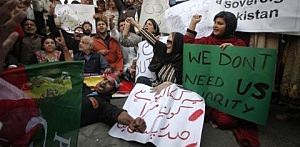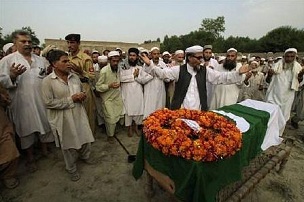US/Pakistan’s Toxic Alliance
Partnering with America has a price. Pakistan has paid dearly. Post-9/11, it has been harmed economically, politically, and strategically. Has its military now had enough and want out? More on that below.
At issue is the latest incident involving NATO forces killing 24 Pakistani soldiers and injuring 13 others in two remote posts along Afghanistan's border.
Army spokesman General Athar Abbas called the attack "unprovoked and indiscriminate. There was no reason for it. Map references of all our border posts have been passed to NATO a number of time."
General Ishfaq Nadeem called them unprovoked blatant aggression, adding that attacking border checkposts deliberately violates coordination procedures.
Internal calls for investigating these type incidents usually follow. Not this time, except, of course, by NATO to whitewash its responsibility.
Abbas said NATO strikes killed 72 Pakistani troops since 2009. Another 250 were injured. Calling them accidental doesn't wash. Pakistan's Inter Services Public Relations (ISPR) denied NATO's claim about responding to live fire on Pakistan's side of the border.
NATO's attack lasted two hours. Senior officers in Peshawar regional headquarters and GHQ Rawalpindi were informed when it started. They immediately asked NATO to stop, saying army troops were targeted. The request was denied.
Following the attack, rage gripped Pakistan. Thousands protested outside Washington's Karachi consulate. People shouted "Down with America." Effigies of Obama were burned. So were US flags.
Protests continue. The Azad Kashmir Legislative Assembly adopted a unanimous resolution condemning the attack.
In Peshawar, so did tribal elders, government workers, lawyers, students, journalists, and others. Pakistan's been on the boil for years over drone civilian killings. Hundreds have died. In 2010 alone, the Human Rights Commission of Pakistan estimated 957. Many more were injured. Thousands overall may have perished and countless others hurt and maimed.
Through July 2011, another 443 died. NATO claims only militants are targeted. Reports show about 50 civilian deaths for each combatant. Western media scoundrels say nothing. Cheerleading, not condemning, imperial wars is their stock and trade.
Russia's anger over America's planned offensive missile defense systems near its borders suggests retaliatory measures. President Dmitry Medvedev calls them "advanced offensive weapon systems" targeting Russia, not Iran or other Middle East states.
Moreover, Russia is deeply concerned about Western intervention in Syria. Its valued Tartus naval base is affected. Protecting it may be prioritized.
Besides strengthening its own military capability, it may cut NATO ties and block Russian supply routes to Afghanistan. Following Washington/Moscow's reset, NATO began transshipping through Russia in 2009. Since then, it's become an important route, now more than ever with strained US/Pakistan relations.
According to Moscow's Institute of Contemporary International Studies deputy director Ivan Safranchuk, Russia plans no immediate response. However, if its concerns aren't addressed, blocking supply routes may happen, he believes.
Pakistan's Defense Committee of the Cabinet (DDC) acted immediately, closing NATO's transit routes to Afghanistan and telling Washington to vacate use of its Balochistan Shamsi base in 15 days. It's used for drone strikes.
DDC also will "revisit and undertake a complete review (of all) programs, activities and cooperative arrangements" with Washington, NATO, and its International Security Assistance Force (ISAF) in Afghanistan. Military, "diplomatic, political and intelligence" areas will be addressed. In addition, other cooperative US/NATO/ISAF arrangements will be reassessed.
Pakistan's Costly US Alliance

NATO's Afghan war gravely impacted Pakistan. Then President Pervez Musharraf was pressured to join cooperate, or else. During a post-9/11 "60 Minutes" interview, he said Washington threatened to bomb Pakistan without it.
Bush administration Deputy Secretary of State Richard Armitage delivered the message through Pakistan's Inter-Services Intelligence (ISI) head, saying cooperate or be "bombed back to the stone age." Ambiguity was avoided for bluntness.
At the time, follow-through was doubtful. Pakistan is nuclear armed, dangerous, and able to strike back hard.
Nonetheless, Musharaff agreed. Secretary of State Colin Powell took full advantage. He demanded use of Pakistan's airspace, closure of its borders with Afghanistan, and use of its territory to launch attacks. In return, Pakistan got billions in mostly military aid.
However, it miscalculated. Early on it estimated spending around $2.7 billion supporting America's Afghan war. Begun on October 7, 2001, ending it by yearend was assumed. Normalcy would follow. Taliban strength would be eliminated. At most, low-intensity conflict would continue with little cross-border effect.
Over 10 years later, war rages. Taliban forces control most of Afghanistan. Pakistan's involvement cost nearly $68 billion. Through 2010, Washington supplied about $18 billion in military and economic aid. Much of it's been conditional on fulfilling US interests. Moreover, it's distributed through NGOs, not directly.
A $50 billion net loss shows much sacrifice with little gain, including internal destabilization perhaps enough to topple Pakistan's government. The economic damage alone shows the results of a bad bargain, especially to a vital "war on terror" partner.
Moreover, bunker mentality grips the country. Barricades and security checks are everywhere. All sorts of problems accompany them. Public anger grows over allying with America.
Insecurity is palpable. It affects everything and touches everyone, including in schools, factories, hospitals, offices, hotels, mosques, and all public spaces. Thousands of civilian lives have been lost. Many thousands more were wounded. Property losses have been huge.
Pakistan's government has also been impacted. Besides billions of dollars diverted from vital internal needs, about 4,000 soldiers died. Many others were injured.
In addition, thousands of troops have been deployed along western border areas with Afghanistan. Doing so left its eastern border vulnerable to Indian aggression, its traditional enemy.
Pre-9/11, conditions were entirely different. Today, hotels are virtual bunkers. So are other facilities. Beefed up security is intense. Security forces with guns are everywhere. So are checkpoints and metal detectors. Paying for it is costly, and for what?
Insecurity, not security and stability, was achieved. Public anger is palpable. Military commanders know they've been used and abused. Pakistan's been military-run since artificially created in 1947. Elections when held are rigged.
Generals run things for Washington as a vassal state. Pakistan is called a military with a country, not the opposite. Its force level, including reservists, tops one million. CIA and FBI agents infest the country. So do Pentagon troops operating out of Pakistan's bases.
Perhaps its officials and commanders now consider changing a relationship gone sour. The latest incident may be used advantageously. The longer it's tied to America's wars, the more its own interests are harmed.
Washington's Afghan adventure was lost years ago. Taliban forces won't quit. Historically, Afghanistan's been disastrous for foreign invaders. Britain and Russia know it well.
Nonetheless, war continues. America arrived to stay. It wants Afghanistan as a land-based aircraft carrier against Russia and China. Pakistan is better served by allying with both countries. Rebuilding relations with neighbors takes time. India is also on its mind.
On November 2, Pakistan joined Russia, China and Iran in Istanbul opposing continued US presence in Afghanistan post-2014. American deployments everywhere are destabilizing and harmful to regional countries. After paying a big price for years, Pakistan may start disengaging from a destructive arrangement.
A Final Comment
Stratfor's George Friedman believes Pakistan "has no qualms about the Taliban running Afghanistan," and won't challenge them if US forces leave. It also wants Washington's involvement ended. Reasons discussed above explained why.
Doing so will also strengthen relations with Taliban forces. Given America's destabilizing influence, it's also advantageous internally to appear less pro-American.
Following US attacks killing Pakistani soldiers in October 2010, Torkham's border crossing was closed for 10 days. This time, things look more serious, Friedman believes. Uncertainty over continuing this supply route got Washington to negotiate with Russia to transship through its territory.
Keeping it is another matter, given growing Washington/Moscow tensions. Currently, both routes account for about equal amounts of supply movements. However, about 60% of fuel comes through Russia, and by yearend, it may reach 75%, as well as similar percentages of other non-lethal supplies.
America's warmaking ability depends on Pakistan and Russian cooperation. Losing it would be strategically disastrous. Friedman says Washington "hopes the Pakistanis will reconsider and that the Russians are simply blowing off steam. Hope is not a strategy," especially after 10 years of war going nowhere.
Pakistan and Russia, of course, want it ended. They also want US forces out and sent home. Given Washington's strategic aims, accomplishing it is doubtful at best.
___________________________________________________________________________________

Stephen Lendman: I was born in 1934 in Boston, MA. Raised in a modest middle class family, attended public schools, received a BA from Harvard University in 1956 and an MBA from the Wharton School at the University of PA in 1960 following 2 years of obligatory military service in the US Army. Spent the next 6 years as a marketing research analyst for several large US corporations before becoming part of a new small family business in 1967, remaining there until retiring at the end of 1999. Have since devoted my time and efforts to the progressive causes and organizations I support, all involved in working for a more humane and just world for all people everywhere, but especially for the most needy, disadvantaged and oppressed. My efforts since summer 2005 have included writing on a broad range of vital topics ranging from war and peace; social, economic and political equity for all; and justice for all the oppressed peoples of the world like the long-suffering people of Haiti and the Palestinians. Also co-hosting The Global Research News Hour, occasional public talks, and frequent appearances on radio and at times television. I also am a Research Associate of the Centre for Research on Globalization. I live in Chicago and can be reached at lendmanstephen@sbcglobal.net. Also visit my blog site sjlendman.blogspot.com and listen to The Lendman News Hour on RepublicBroadcasting.org Monday - Friday at 10AM US Central time for cutting-edge discussions with distinguished guests on world and national issues. All programs are archived for easy listening. My new book "How Wall Street Fleeces America: Privatized Banking, Government Collusion and Class War" can be ordered HERE.
___________________________________________________________________________________
Photo 1: Reuters/Ali Imam
URL: http://www.a-w-i-p.com/index.php/2011/12/02/us-pakistan-s-toxic-alliance

























